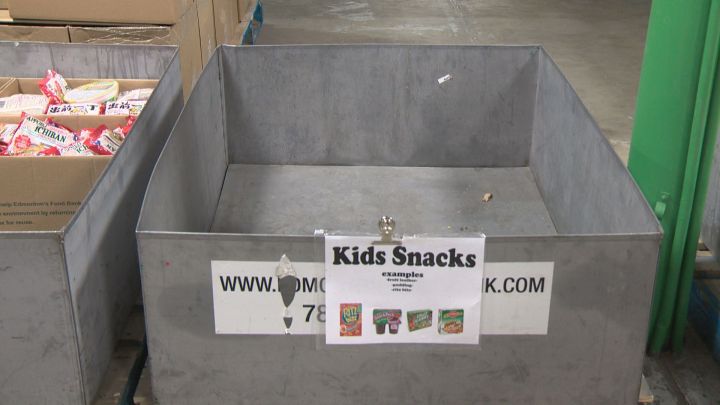In one of the richest countries in the world, residents worry about putting food on the table.

It’s no minor issue: 40 per cent of Canadians want the party leaders to talk about rising food prices this election, according to a recent Ipsos poll for Global News.
Earlier this month, the crisis became visible in Canada’s energy-industry engine: Alberta Food Banks put out a call for more donations due to higher demand.
“The shelves are bare,” their July 21 release said.
“We have now seen, in the last two or three months, an increase across the board,” said Stephanie Rigby, executive director of Alberta Food Banks.
In Fort McMurray, food bank use was 57 per cent higher in the first half of 2015 than it was in the previous year.
“I think the last time it was this severe in Alberta would have been back in 2009,” she said, referring to the height of the recession.
READ MORE: Shelves bare at several Alberta food banks as usage increases
But a food bank is often someone’s last resort. Many more Canadians are “food insecure”: They worry about food or have difficulty buying healthy food, or enough food. At the extreme end, roughly 336,700 households reported occasionally skipping meals in 2012 because they weren’t able to afford to buy enough, according to a 2014 report from PROOF, a research group looking at food insecurity in Canada.
The study, based on a health survey from Statistics Canada, found that 12.6 per cent of Canadians reported worrying about being able to afford to feed their families. Some of them bought cheap, less-nutritious food or even skipped meals.
Living in these conditions has profound effects on people’s health, said Valerie Tarasuk, a professor of nutritional science at the University of Toronto and lead researcher on the study.
“Somebody raised in these conditions is not a productive member of society in the same way that they could be,” she said.
“You raise children in this situation and you mark them for life.”
A number of factors make you more likely to be malnourished.
Being poor is one. Having children is another. So is being single. Being single with children is particularly bad. Renters are also much more likely to be food insecure than homeowners. Black people and aboriginals are also over-represented.
“The sickening thing about this problem is that it’s really quite predictable who’s struggling,” Tarasuk said.
Where your income comes from matters too, she said.
“To be on social assistance is to be assured of being food insecure.”
But having a job doesn’t make you immune: 62 per cent of food-insecure households report that their main source of income is wages, a salary or self-employment.
“I have increasingly come to believe that what we’re picking up with this measure of food insecurity isn’t a food problem at all, that what we’re capturing is material deprivation,” Tarasuk said.
She said the toll it takes on families goes beyond empty tummies.
“Those kids that are in that home, even if they’re managing to get three square meals a day, which they’re probably not, they are missing a whole lot more than just three square meals. And the adults in those situations are stressed beyond belief.”
How do you end hunger?
Even the executive director of Alberta Food Banks doesn’t think food banks, even well-stocked ones, will ultimately fix food insecurity. “When they started 30 years ago, it was to be a temporary, emergency event, and no one in their wildest dreams thought we would still have food banks 30 years later in a country like Canada.”
The solution comes down to poverty reduction, Tarasuk argues.
She’d start with social assistance, which leaves people well below the poverty line in every province.
Newfoundland and Labrador went from one of the most food-insecure provinces in 2007 to one of the best in 2012, partly due to changes to their social assistance, which was indexed to inflation in 2006. Nova Scotia has since followed suit.
“There’s no super quick fix that’s going to solve everything about food insecurity in Canada, but we think that the most important first step we could have would be to have a basic annual income and ensure that nobody falls below that range,” said Diana Bronson, executive director of Food Secure Canada. She knows that this won’t happen overnight, but hopes that the idea could at least be studied. “What we want is that study to be done, so we start to get action moving in the right direction.”
Tarasuk also points to anti-poverty initiatives for seniors.
Studies have shown that single people facing food insecurity during their adult lives are much less likely to have that problem when they turn 65.
“We’ve got an income floor in place that is indexed to inflation, and we’ve paralleled it with some other things like drug benefits,” she said. “A starting point for managing the health and well-being of seniors is to provide income security at a reasonable level with indexation to inflation.”
Putting food on the election table
Advocacy organization Food Secure Canada is trying to get food on the election agenda. Its campaign “Eat, Think, Vote” calls for the creation of a national food policy that includes healthy school food, affordable food in the North, support for new farmers and work towards “zero hunger.”
It’s asking candidates to sign a pledge in support of the program. Eighteen have signed so far, including Green Party leader Elizabeth May and the NDP’s Paul Dewar and Megan Leslie. Local organizations are also inviting candidates to talk about food issues in their communities.
“We don’t have a strategy in this country that ensures that everybody has access to adequate food,” said Diana Bronson, executive director of Food Secure Canada.
“We have an agricultural export strategy but we don’t have a strategy to eliminate hunger in our midst.”




Comments